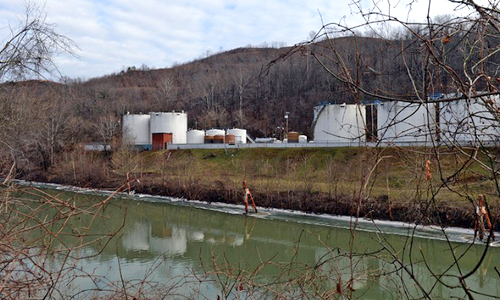

So the question is, how dangerous are these chemicals, and do workers need better protection against them?
Chemicals You Can Find at a Coal Prep Plant
Most chemicals used in coal preparation don’t appear too dangerous to human health, according to the Material Safety Data Sheets (MSDSs) provided in the Marshall County cases. In case you’ve never heard of MSDSs, these information sheets list chemical product contents, potential hazards, and potential health risks. They are prepared by chemical producers and are supposed to accompany any chemicals used in a workplace. The U.S. Occupational Safety and Health Administration requires that MSDSs be made “readily accessible” to employees.
But companies often withhold the exact contents or proportions of chemical mixtures as trade secrets. And that’s not the only information that’s missing; in the case of the MCHM spill, public health specialists have had a hard time proving just how dangerous (or safe) MCHM is, since not enough testing has been done to know for sure.
The Elk River spill makes the evidence presented in the two Marshall County lawsuits all the more immediate. Documents presented as evidence in the cases reveal that exposure to these chemicals—especially without the proper safety gear—can cause serious health problems ranging from pulmonary edema to central nervous system problems, birth defects and heart problems.
In a response to a request for evidence in one of the lawsuits—Denver and Debra Pettry, et al. v. Peabody Holding Company, et al.—chemical company Cytec Industries Inc. provided MSDSs for the chemicals it had sold since Dec. 1993 to defendants Massey Coal Services Inc., Goals Coal Company, Performance Coal Company, Bandytown Coal Company, and Elk Run Coal Company Inc.
While these documents do not constitute a complete list of the chemicals used in coal prep plants, they do offer a snapshot of the potential health hazards that prep plant workers like Price faced and still face.
The UMWA believes updates to U.S. Mine Safety and Health Administration standards regarding these chemicals are long overdue.
“We continue to see cases of cancer and other health issues due to chemical exposures,” said Dennis O’Dell, director of the UMWA’s Department of Occupational Health and Safety. “The PELs or Personal Exposure Limits have not been adjusted since the 1980s. We believe that MSHA (and OSHA) should reexamine PELs and further a study to see what occurs when workers become exposed to multiple chemical[s] at once. Right now we have MSDS material on each individual chemical, but what happens when those are all used at the same time?”
The Mine Safety and Health Administration acknowledged this point. “There are no permissible exposure limits for many of the chemicals used in coal processing,” MSHA’s Technical Support division said in response to inquiries for this article. “However, these chemicals are considered hazardous and are covered by MSHA’s Hazard Communication standards.”
On April 9, MSHA issued a health hazard alert in response to the coal processing chemical spills earlier this year. The alert reminded operators that miners and plant employees must be provided information on the chemicals they’re using.
Alpha Natural Resources (which acquired defendant Massey Coal Services Inc.) and the American Chemistry Council did not respond to interview requests. Representatives of Peabody Holding Company, BASF Corporation (which acquired defendant Ciba Specialty Chemicals Corporation), and the American Chemistry Council had no comment. OSHA did not comment on the record.
Safety Precautions Were Ignored, Workers Say
During Jackie Browning’s 14 years working in coal mines, he always wore a respirator. But when the Naoma, WV, resident started operating a bulldozer at a coal prep plant in 1991, he didn’t think he needed one any more.
Browning worked outside around the coal piles, not indoors with the frother, and he says that for the first seven years, the job didn’t seem to affect his health.

 233k
233k  41k
41k  Subscribe
Subscribe 
